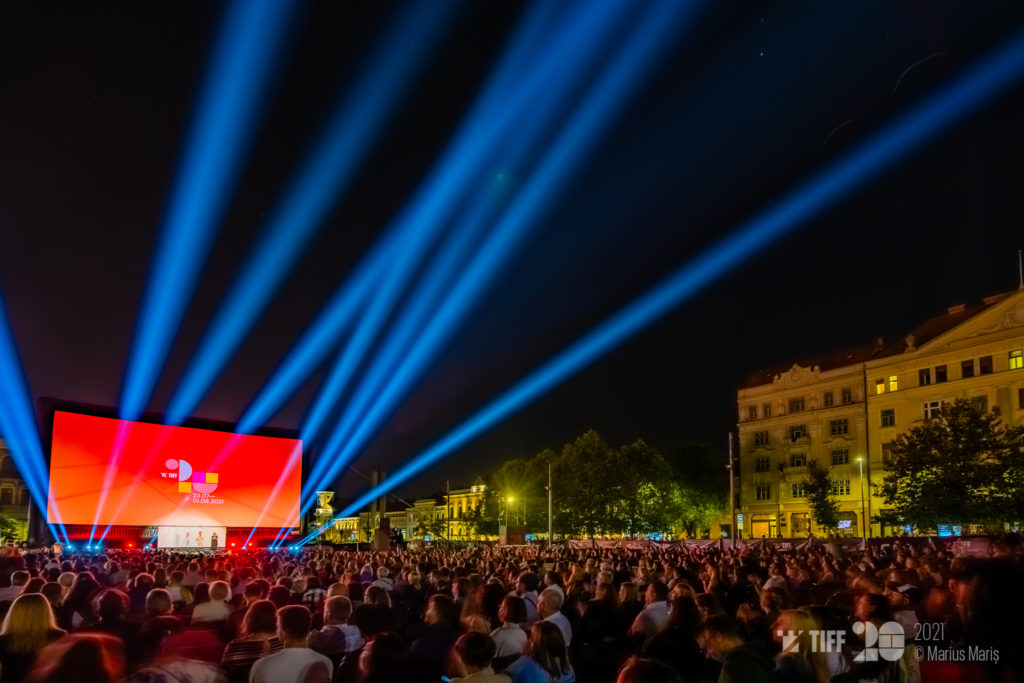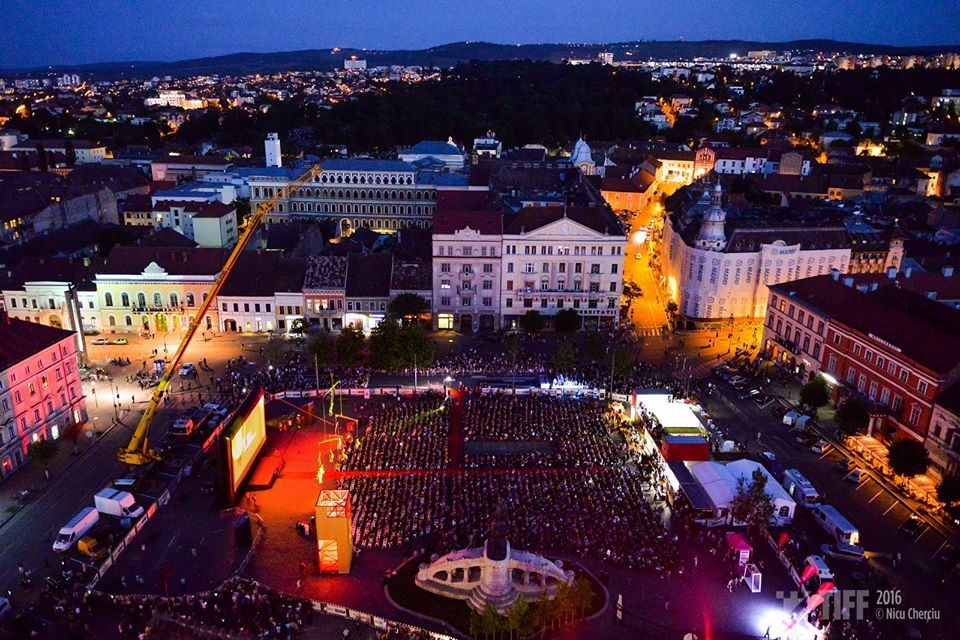:quality(80)/business-review.eu/wp-content/uploads/2018/05/Mihai-Chirilov.jpg)
The Transylvania International Film Festival (TIFF) returns in full force between June 17-26, to the way it used to be before the pandemic. Business Review talked to Mihai Chirilov, TIFF’s artistic director, about post-pandemic cinema.
By Oana Vasiliu
What will be the size of the lineup at this edition? Will it be smaller than usual?
It’s going to be just like in the good old times, with almost as many movies and events as we used to have before the pandemic. As most people know, TIFF was successfully carried out as an in-person event even during the pandemic, by sacrificing its usual size due to an absence of indoor locations (in 2020) and proper screening conditions (in 2021). Right now, there is no reason to hold back. Masks are gone, and so are the annoying (if not abusive) restrictions and physical distancing rules.
There’s a catch though: the terrible inflation has made us move with caution when preparing the current edition, and to ponder just how many movies and guests we could accommodate within our budget during the ten days of the festival. There will be slightly fewer films than there were in 2019, but all in all the 2022 edition qualifies as a normal one—whatever “normal” might mean nowadays.
The last twenty years have established the festival as an extremely connective and vibrant experience, and these were precisely the values that were the most affected and endangered by the pandemic. We want people back, congregating and communicating, getting together through art.
That’s why we are going to emphasize TIFF’s social dimension and the need for cerebral dialogue by introducing a music sidebar called Soundsquare, located in the nicely refurbished inner courtyard of the Arts Museum and dedicated to emerging bands, and by adding daily talks about certain films debated by key public figures. Obviously, those said films are dealing with some of the hottest topics today: abortion (“Call Jane”), election tricks (“Kingmaker”), (blind) justice and authoritarianism (“Leave No Traces”), and Russia (“Navalnyi”).

Which movies do you consider to be the greatest catches of the year?
Every film that has just been screened at Cannes and reaches TIFF in such a short time is a great catch. “Final Cut!” directed by Oscar winner Michel Hazanavicius opened the French festival and now lands in the Unirii Square in Cluj, expecting to gather a couple of thousands of viewers. So does “Metronom,” the Romanian debut feature that brought Alexandru Belc the directing prize in the Un Certain Regard sidebar.
Icelandic writer-director Hlynur Pálmason returns to TIFF after having been awarded here for his two previous films “Winter Brothers” and “A White, White Day,” with “Godland,” equally shown in the Un Certain Regard section. The newest work by one of the Transylvania Trophy winners premiered in Cannes and will get the coveted Surprise Film slot in Cluj (watch out for upcoming news!).
Elsewhere, we are happy to host the Romanian premieres of: “Alcarras” (the Berlinale’s Golden Bear, d. Carla Simon); “The Good Boss,” the top winner at this year’s Spanish Oscars (d. Fernando Leon de Aranoa, with Javier Bardem in the main role); the newest works by TIFF regulars Peter Strickland (the outlandish “Flux Gourmet”), Ulrich Seidl (the provocative “Rimini”) and Chilean Matias Bize (the intimate and devastating “Private Messages”).
Last but not least, and possibly the greatest catch of them all, is the Krzysztof Kieślowski retrospective, with most films shown in brand new restored prints, including the “Three Colors – Blue, White, Red” trilogy, complete with a rare photo and multimedia exhibition as part of the big Polish Focus put together at this edition.
How would you say the purpose of TIFF has changed over the past two pandemic years?
The pandemic had nothing to do with the purpose of TIFF, which has always been the promotion of cinematic art and freedom of expression by presenting some of the most innovative, intriguing, and relevant films of the moment. But since the pandemic and its absurd implications “succeeded” in dividing people and threatening freedom of speech and critical thinking, we may be feeling a stronger urge than ever to better define ourselves as a free-spirited platform that defies ideological extremes and narrow-mindedness.
Which Competition film do you think might surprise audiences?
Entering its third decade of existence, TIFF supplements its traditional competition (open to first and second-time directors of fictional works) with a cutting-edge category called What’s Up, Doc?, dedicated to first or second-time documentary filmmakers. Times have changed, and so have genre aesthetics. There are more and more documentary-drama hybrids that either blur the line between documentary and fiction or playfully explore (and sometimes bend) the genre’s limits and conventions, and thus risk upsetting purists. These are the types of films we’ve selected for this new competition.
Everything is allowed, even blasphemy, up to the point where you no longer know what you are looking at, what’s real and what’s not. In this context, the audience is very likely to be compelled by visual artist Yuri Ancarani’s “Atlantide” and his picturesque (or never-before-seen) portrayal of Venice, bordering on psychedelia. The last ten minutes of this film are simply spellbinding.
In the fiction competition, chances are that you’ll either be seduced by the hypnotic beauty and the violent poetry in “Beautiful Beings” (d. Guðmundur Arnar Guðmundsson) or sucked dry into the convoluted mysteries of “The Execution” (d. Lado Kvataniya), a dark Zodiac-like thriller that makes it increasingly hard for any trained viewer to anticipate its denouement.
What should people make sure they don’t miss this year at TIFF?
First of all, the special screening of “Nosferatu” in the spooky setting of the Banffy Castle in Bontida, marking the centenary of this classic silent horror by F.W. Murnau, complete with a new score written for a huge orchestra by the uber-talented Simona Strungaru. I wouldn’t mind the nostalgia trip provoked by the tribute screening of Buena Vista Social Club, the cult doc directed in the late ‘90s by Wim Wenders—especially since one of the band’s last standing men Eliades Ochoa will be performing live in Cluj on the occasion.
Three other documentaries are not to be missed: “The Orchestra with the Broken Instruments” (d. Yuval Hameiri), a highly successful experiment that ended with an impressive and cohesive performance of Israeli and Palestinian musicians using damaged instruments; “The Balcony Movie” (d. Pawel Lozinski), the simplest yet most clever idea for a film ever; and “The Round Number” (d. David Fisher), with an edgy and fearless investigation of a tabu matter which is very likely to stir controversy.
You’ll be much safer booking your ticket for one of the salivating Film Food events (matching a themed film screening with a sophisticated dinner prepared by a celebrity chef; they usually sell out quickly, so move fast) or watching the newest—and shock-free—film directed by enfant terrible Gaspar Noe, “Vortex.” Gerard Depardieu as “Maigret” is a treat, and so is the extended final car chase in the action-packed Korean film “Escape from Mogadishu.” And if you want some roaring fun, take a chance with either “The Unemployment Club” and its irreverent comedic romps or “Cop Secret”, a buddy-movie parody with gay cops.

How important is it for you to show films that are original and experiment aesthetically or narratively?
It’s crucial to constantly engage and intrigue an audience that, over twenty years of TIFF, has grown up with challenging films and got used to a high level of artistic stimulation. Conformity is the biggest threat a society may face, especially when fuelled by mindless entertainment, cheap propaganda or so-called cultural products designed to make you comfortably numb.
Many festivals are expanding into TV programming. Would you consider including a TV selection (including Amazon, Netflix, HBO, etc.) at TIFF?
We’ve been having the HBO Day at TIFF for ages, showcasing the best international miniseries (in marathon screenings) or local shows. In 2021, we introduced a pilot programme (nicknamed Coming Up Next), dedicated to the ever-increasing number of series lovers, by presenting a couple of episodes per chosen series as an appetizer. Once again, we don’t go for the obvious titles, but instead tease viewers with eccentric propositions, namely those series that sit below the radar of the standard consumer, such as the successful Serbian horror mystery “Block 27,” the funky Finnish rom-com “Mister8” or the somber policier “The Dark Heart,” directed by a TIFF alumnus, Danish Gustav Moller.



:quality(80)/business-review.eu/wp-content/uploads/2024/06/Piata-Unirii-Gala-de-Deschidere-14.06-Fred-web_81.jpg)



:quality(80)/business-review.eu/wp-content/uploads/2024/06/22C0420_006.jpg)

:quality(80)/business-review.eu/wp-content/uploads/2024/06/COVER-1-4.jpg)



:quality(50)/business-review.eu/wp-content/uploads/2024/06/Parcul-Etnografic-Proiectie-Vulturii-din-Taga_14-06-2023_TIFF_Chris-Nemes.jpeg)
:quality(50)/business-review.eu/wp-content/uploads/2024/06/1.-Piata-Unirii.jpg)
:quality(50)/business-review.eu/wp-content/uploads/2024/06/GALA-de-DESCHIDERE_115-TIFF-2022.06.17-NYC_8663_Nicu-Cherciu-web-1.jpg)
:quality(80)/business-review.eu/wp-content/uploads/2024/06/br-june-2.jpg)
:quality(50)/business-review.eu/wp-content/uploads/2024/07/vodafone-RO.jpg)
:quality(50)/business-review.eu/wp-content/uploads/2024/07/BeFunky-collage-37-scaled.jpg)
:quality(50)/business-review.eu/wp-content/uploads/2024/07/04_ThinkPad_T14s_6_Business_Coworking.jpg)